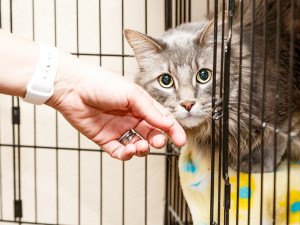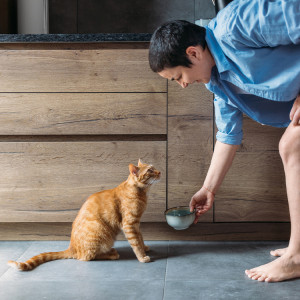How to Prevent – or Treat – Cat Ear Infections
How to prevent an ear infection (and treat one if it’s too late)

Share Article
I didn’t have much experience with cats until a few years ago when a little runt off the street snuck in through the front door and decided to stay. I’ve since received a crash course on all things cat, but I’m no expert and frequently wish she could just tell me what’s wrong.
Like the time I noticed she was scratching her ears. The incessant itching was making me uncomfortable but I didn’t realise how serious it was for her. Could mites be crawling around in there? Something more sinister? Or was I an overly concerned new cat mum? I peered into her ear cave to find out and once I squinted past the wispy curtain of fur, the walls of her ears appeared to be covered in a dark, dubious gunk that didn’t look right to me. Also, gross.
What causes ear infections in cats?
“Ear infections in cats don’t occur quite as commonly as in dogs but when they do, they can cause some serious damage,” says Dr Sarah Dougherty, DVM. “The most common cause of ear infections in cats are ear mites, but they mostly affect kittens and outdoor cats.” Ear mites are microscopic, super-contagious parasites that block a cat’s ear canal with a dark, grainy matter that kind of looks like coffee grounds.
Food and environmental allergies can also be culprits, most commonly proteins from poultry and dust mites (yes, more mites). “Cats can also get infections caused by yeast and bacteria,” adds Dr Dougherty. Or simply a buildup of wax or fur.
How can I tell if my cat has an ear infection?
“Cats produce more ear wax than dogs,” says Dr Dougherty, so it’s normal for cats to have a thin layer of yellow wax hanging around. If you’re seeing more than that say, on the outer ear and on the fur outside the ear, you should see your vet. Cats with ear infections will shake their heads and paw at their ears. You may notice hair loss or crusty scabs around their face and neck from all the scratching.
And if you get close enough, you’ll see redness and swelling and smell a funny odour. Since the ear canal controls balance – for people and pets – an ear infection could also cause your cat to act disoriented and well, weirder than usual.
How can I clean my cat’s ears?
While there’s no way to truly prevent an ear infection, cleaning your cat’s ears once a month with an antibacterial or antifungal solution can stave off mites, yeast, and bacteria (steer clear of cleaners with hydrogen peroxide or alcohol as they can irritate the sensitive ear canal). First, swaddle your cat in a towel if you expect they are going to fight you tooth and nail. Next, squirt a little of the solution in, close your cat’s ear flap and massage it in.
Then let your cat shake their head, loosening wax and anything else that shouldn’t be in there. Finally, with a cotton pad, wipe up whatever comes to the surface (don’t use cotton buds as they can damage the eardrum). If you need a hand, your vet or a professional groomer should be able to get the job done without a scratch.
Too late. How are ear infections in cats treated?
In my cat’s case, she was diagnosed with infections in both ears, likely triggered by environmental allergies. Living as an LA stray, yeast has lived rent-free in her ears long enough to form a thick layer of gunk, which was causing my newly domesticated house cat a lot of discomfort. Our vet gave her ears a good cleaning and prescribed antibiotic drops and in a couple of weeks her ears healed. If left untreated though, Dr Dougherty says, “A cat can suffer permanent damage to the structures of the ear canal, ear drum, and inner ear… or permanent loss of hearing.” Good thing my cat’s ears are now all clear and I’m pretty sure she can hear me when I call… even when she pretends not to.

Helin Jung
Helin Jung is a writer in Los Angeles.
Related articles
![Siamese cat in the middle of sneeze]()
Did Your Cat Just Sneeze Like a Human? Here’s Why
Kitty sneezes can be alarming, but they’re not always cause for concern
![White-and-brown cat sitting on a side table by a lamp with their mouth open, gagging]()
Your Cat Is Gagging. Should You Panic?
It’s not always an emergency – but it could be
What to Know About Runny Noses in Cats
Nasal discharge doesn’t sound cute, but you need to know what to look out for
![Person with short hair putting water bowl on floor for cat]()
8 Ways to Get a Cat to Drink Water
Their desert-dwelling roots might resist hydration, but these tricks can help
![Owner pets senior ginger cat.]()
6 Common Health Concerns in Senior Cats
How to spot and how to treat them







